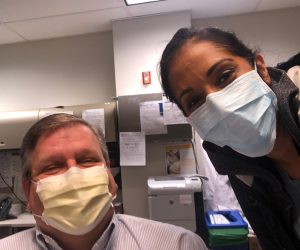
Dr. Dua (right) with colleague Eric Ruderman, MD, (left) are taking turns working rotations in their clinic to limit staff.
We are doing everything possible to maintain continued delivery of patient care, while promoting social distancing and safety. We have converted outpatient rheumatology visits—both for returning and new patients—to virtual encounters done from home. We have two nurses, one front desk staff member and one physician on-site at clinic to help manage infusions, triage any patients who may show up at clinic and also help move along paperwork, such as prior authorizations and disability paperwork.
Patients continue to come into our infusion center for their medications, but we have decreased the number of chairs at any given time to allow for distance between patients, and we have reduced all non-critical infusions. There is a delay on any non-urgent imaging studies, and most of our consult service is being done outside of patient rooms. We have biweekly online meetings that involve all of the faculty, fellows, physician extenders and nurses to discuss the COVID-19 crisis and troubleshoot any concerns or issues people are facing.
Q: What are patients’ chief concerns regarding COVID-19’s potential risks and symptoms?
This is a time of heightened anxiety for everyone, including our patients. By definition, the majority of our patient population is immunosuppressed at baseline, and they have very significant concerns and fears surrounding the COVID-19 pandemic. They want to know if they are at higher risk of infection and whether it is safe to leave their homes to go for lab testing, pick up medications or buy groceries.
Many patients are asking whether they should decrease or stop any of their immunosuppressive therapies or how their medications may affect their risk of getting or fighting COVID-19. Others have very real concerns about whether they will have trouble accessing medications they have been on chronically for their underlying disease, especially in light of the frenzy surrounding the use of hydroxychloroquine.
We are trying to provide reassurance and ensure access to medications, while encouraging social distancing and aggressive hand hygiene. There is also a group of students at NMH helping deliver groceries and medications to patients who are debilitated and have transportation issues.

Virtual happy hour gives Dr. Dua and colleagues an opportunity to stay connected after the work day.
Q: How is the pandemic affecting you and your staff personally?
There are very real fears and anxiety and the usual outlets—such as social interaction and exercise—are now severely limited. Personally, it’s hard to sleep, hard to focus and hard to figure out what even to focus on. There is a very real tension between wanting to be ready and prepared to help wherever needed on general medicine/COVID-19 services against the background of questioning how equipped I am to do this well. There is a thirst and drive to try and learn as much as possible about this disease to gain insight and understanding, but there is an overwhelming amount of information and a complete lack of information, all at the same time.



